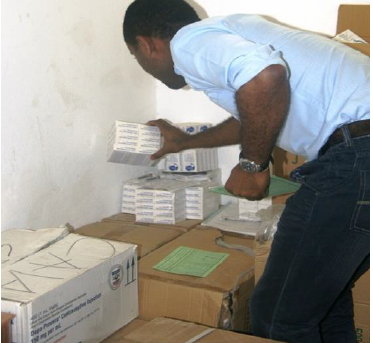Speeches Shim
CENTRAL CONTRACEPTIVES PROCUREMENT (CCP) ![]() (pdf - 188k)
(pdf - 188k)
OVERVIEW
USAID’s family planning and reproductive health (FP/RH) program aims to: 1) increase access to a wide range of modern contraceptive methods and high quality services for postpartum women, HIV positive women and adolescents, high parity women, and post-abortion care women at both community and facility levels; 2) increase demand for modern contraceptive methods and high quality FP/RH services; 3) strengthen social behavior change communication interventions; and, 4) strengthen FP/RH systems in strategic planning, human resources, financial systems, commodities, and supply chain management. Improving civil society engagement regarding family planning and sexual reproductive health/safety plays an invaluable role in USAID’s support to the health sector in Mozambique. As the largest bilateral donor of family planning assistance in the world, USAID continues to support safe, effective, and acceptable contraceptive technologies designed for provision and use in low-resource settings. Increased use of modern contraceptives by Mozambicans who specifically want to avoid pregnancy saves lives and improves health.
PROGRAM DESCRIPTION
Condom availability and use in most countries is inadequate and funding for the procurement of condoms is often unavailable. To fill this important gap, CCP administers the Commodity Fund (CF). The CF aims to increase condom availability for HIV and AIDS prevention by providing condoms free of charge to non-focus countries. The program implements the USAID policy of centralized contraceptive and condom procurement by providing a simplified mechanism for the transfer, obligation and disbursement of all USAID funds designed for contraceptive and condom procurement.
EXPECTED RESULTS/IMPACTS
The forecasting and supply planning of contraceptives, condoms and maternal child health commodities is done annually with quarterly supply plan updates. With the support of the Global Health Supply Chain – Procurement and Supply Management (GHSC-PSM) project, the annual workshop for the forecasting and quantification of national needs for 2017 and 2018 was held July 2016 with the participation of a number of NGOs, international organizations and government ministries. In addition, the project supported family planning program analyzing the contraceptive requisitions sent during three quarters. The exercise was based on historical distribution data, consumption data and stock data from central and provincial levels.


Comment
Make a general inquiry or suggest an improvement.